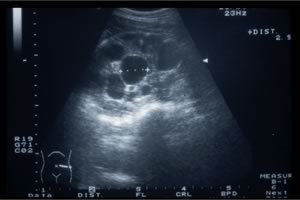This article is a general guide for people who have been referred for tests to see if they have ADPKD.
The way in which ADPKD is diagnosed depends, in part, on your personal circumstances. The diagnosis can be made in most people using a scan to look at their kidneys; less commonly a blood test is required for genetic testing.
If you have a family history of ADPKD, you’re more likely to have the disease than other people.
About 10 to 15 out of every 100 people (15%) with ADPKD don’t have a family history of the disease. The process for diagnosis can be different if you don’t have a family history of ADPKD.
Although the presence of cysts in the kidneys suggests a diagnosis of ADPKD, there can be other causes of kidney cysts too. Therefore, your doctor will assess you for these other possibilities before making a diagnosis of ADPKD. Your doctor may suggest genetic testing to help confirm or rule out a diagnosis of ADPKD for you.
An ultrasound scan uses high frequency sound waves (which humans cannot hear) to make an image of the inside of the body (Figure 1). Using ultrasound, a specialist can examine your kidneys from outside your body.

Figure 1: Ultrasound picture of a kidney with multiple cysts
Several cysts are identified in this kidney. The larger cysts are marked by arrows, and appear as dark circles. In a person with a family history of ADPKD, a picture like this establishes that the person has ADPKD.
In ADPKD, cysts develop over time, and so might not be present in children or young adults. Therefore, if you’re under 30, it may not be possible to use ultrasound to confirm a diagnosis of ADPKD, even if you have a family history of the condition. You may be advised to have ultrasound scans periodically repeated in the future, to check for cysts as you get older. Similarly, ruling out a diagnosis of ADPKD in people under 40 years is difficult. However, by age 40, a diagnosis of ADPKD can be ruled out in individuals who don’t have multiple kidney cysts.
ADPKD is caused by a faulty (mutated) gene. Mutations in one of two genes can cause the disease: PKD1 or PKD2.
Genetic testing is usually performed on sample of blood. It checks the DNA in this blood sample for faults in the PKD genes. Genetic testing is the most accurate way of making a diagnosis of ADPKD. It’s available through the NHS, but it’s not required to make a diagnosis of ADPKD in most people.
To find out more about genetic testing – and whether it might be appropriate for you – see our web page ‘Genetic counselling and genetic testing in ADPKD’.
Written and reviewed by:
Professor Patricia Wilson, UCL Centre for Nephrology, Royal Free Hospital, London
Dr Roz Simms, Nephrologist, Sheffield Teaching Hospitals NHS Foundation Trust
Dr Richard Sandford, Consultant Clinical Geneticist, Addenbrooke’s Hospital
With thanks to all those affected by ADPKD who contributed to this publication.
UNDER REVIEW
Disclaimer: This information is primarily for people in the UK. We have made every effort to ensure that the information we provide is correct and up to date. However, it is not a substitute for professional medical advice or a medical examination. We do not promote or recommend any treatment. We do not accept liability for any errors or omissions. Medical information, the law and government regulations change rapidly, so always consult your GP, pharmacist or other medical professional if you have any concerns or before starting any new treatment.
We welcome feedback on all our health information. If you would like to give feedback about this information, please email .
If you don't have access to a printer and would like a printed version of this information sheet, or any other PKD Charity information, call the PKD Charity Helpline on 0300 111 1234 (weekdays, 9am-5pm) or email .
The PKD Charity Helpline offers confidential support and information to anyone affected by PKD, including family, friends, carers, newly diagnosed or those who have lived with the condition for many years.
